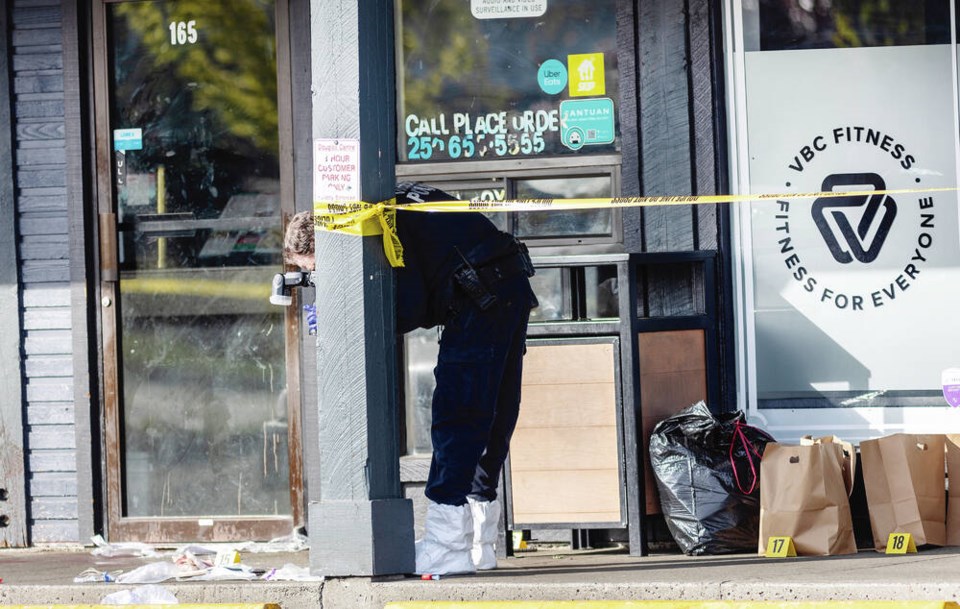Criminals are moving into supportive housing facilities in Victoria specifically to prey on vulnerable people, says the city’s police chief.
“What happens is they pose as people experiencing homelessness,” Del Manak told members of the Greater Victoria Chamber of Commerce on Tuesday, a day after police responded to the seventh stabbing in the city in the past six weeks.
“They embed themselves in the very facilities where people are vulnerable and marginalized. And then they’re able to exploit them, extort them out of their suites,” he said.
“It’s only four or five months later when there’s a stabbing in the stairwell of a supportive housing location that we find out that this individual is actually a criminal and they actually have a place [elsewhere].”
Manak made the comments as part of a panel discussion on public safety and how it relates to housing, mental health and policing.
He did not specify how frequently infiltration of supportive housing facilities occurs, saying only that “most” sites have embedded criminals or their associates.
“We don’t hear about it till somebody gets stabbed or they get extorted,” he said to the Times Colonist.
“Staff at the supportive housing locations are amazing, they do a great job,” Manak said. “But I’m just telling you, the criminal element is smart and they know how to work their way through to be able to carry on with their criminality.”
Those living in supportive housing don’t speak openly about it due to fears of retribution, he said.
Fellow panelist and Pacifica Housing Advisory Association chief executive Carolina Ibarra said people whose basic needs are not being met are more at risk from organized crime.
“Our most vulnerable citizens need to be protected from criminal elements,” she said.
Ibarra said protection is available at Pacifica Housing properties, where access is controlled and staff are on site, but “the challenge [is] in sites that don’t have full supports or staffing and don’t have controlled access.”
Pacifica collaborates closely with police to prevent unwanted individuals from gaining access to those locations, she said.
In an interview, Ibarra told the Times Colonist that it would be a disservice to consider people living in supportive housing as criminals.
“Certainly, the chief must be speaking of something he’s observed,” she said. “But at least in Pacifica housing, that is not the profile of our residents.”
Prospective supportive housing residents usually do a tour of the site and undergo a needs assessment before they are housed so it is very unlikely for infiltration to occur, she said.
But there are higher risks during sudden, large-scale transitions from street living to supportive housing, Ibarra said.
A temporary transitional site in Nanaimo that was established in response to the clearing of a large encampment in 2018 took two years to stabilize, Ibarra said. “We didn’t know who everyone was or what they needed because of the way that order was issued.”
Today, it’s one of Pacifica’s more successful sites, she said.
Ibarra said that Pacifica accepts people with criminal records in their supportive housing facilities.
“That is a part of the homelessness issue, with people being released onto the street,” she said, adding that the organizationworks with residents in preventing recidivism.
People without a home are often only thinking about survival, Ibarra said. “Sometimes they do things that they don’t want to do to keep themselves safe.”
“Housing is really the No. 1 protection. From there, every other service can be bolted on,” she said.
Pacifica Housing, the largest affordable housing provider on Vancouver Island, operates about 240 supportive housing units in the capital region and in Nanaimo, Ibarra said.
Asked by chamber CEO Bruce Williams for an update on recent stabbings, Manak told the audience that the seven incidents were not linked to a single person. He said he could not provide further details due to ongoing investigations.
Crime analysts are analyzing trends and examining any possible links to organized crime and “street entrenched individuals” to determine VicPD’s next steps, Manak said.
Jonny Morris, CEO of Canadian Mental Health Association of B.C., said it was important to approach the issue of public safety in its full complexity.
“We soundbite in ways where people start to make these unfortunate linkages — unhoused people equals unsafe, or mental illness equals violence,” he said. “Those are simply not factual statements.”
Manak pointed out that stabbings are not limited to any specific part of the city. “Stabbings can happen inside a residence, it can happen out in the street. It can happen downtown, or it can happen in other residential areas.”





